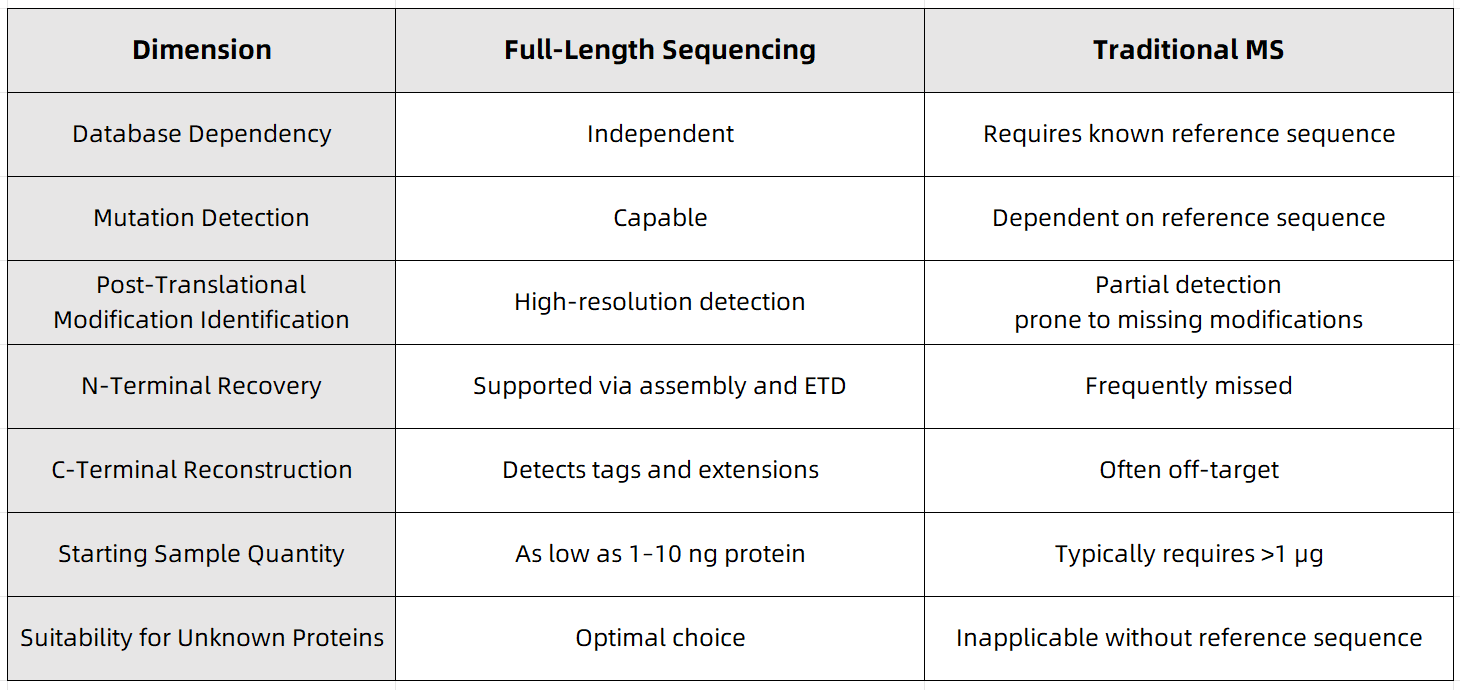Protein Full-Length Sequencing: Principles and Applications
Protein full-length sequencing plays a fundamental role in life sciences research and biopharmaceutical development by enabling the decoding of a protein’s primary structure—that is, the linear sequence of amino acids—which is essential for understanding its function, validating its expression, and confirming structural consistency. Conventional protein identification methods primarily depend on known genes or database support, which presents limitations when analyzing unknown proteins, synthetic constructs, or translation products with atypical modifications. This is where the technical value of protein full-length sequencing becomes evident: leveraging high-resolution mass spectrometry and spectrum reconstruction algorithms, it enables the inference of complete protein sequences directly from raw spectral data without relying on reference databases. This paper systematically introduces the fundamental principles, experimental workflows, and representative applications of this technology, aiming to help researchers and biopharmaceutical developers gain a deeper understanding of its distinctive role in structural confirmation.
What is Protein Full-Length Sequencing?
Protein full-length sequencing is a structural analysis technique that integrates multiple enzymatic digestions, mass spectrometric analyses, and spectrum reconstruction strategies. Its core concept is to enzymatically digest the target protein using a set of specific proteases to generate overlapping peptide segments. These peptides are then analyzed via high-resolution mass spectrometry to obtain fragment ion data, which is subsequently assembled into a full-length amino acid sequence from the N-terminus to the C-terminus using AI-driven algorithms. The method operates independently of known reference sequences, making it particularly suitable for identifying unknown proteins and structural variants that traditional identification approaches may not resolve.
Core Principles of Protein Full-Length Sequencing
1. Multi-Enzyme Digestion to Generate Redundantly Covered Peptides
(1) Employ proteases with distinct specificities (e.g., Trypsin, Chymotrypsin, Glu-C, Asp-N);
(2) Each protease yields peptide segments with unique cleavage points, producing overlapping and cross-stitched regions;
(3) Enhances structural coverage and prevents sequence gaps.
2. High-Resolution Mass Spectrometry to Acquire Fragmentation Spectra
(1) Utilize high-sensitivity instruments such as Orbitrap Eclipse, timsTOF Pro, or Q Exactive HF-X;
(2) Perform MS/MS fragmentation of each peptide to collect ion stream data, including b/y ions and ETD fragments;
(3) Enables detection of modified residues (e.g., phosphorylation, acetylation) and N-/C-terminal variants.
3. AI-Driven De Novo Assembly Algorithms
(1) Use algorithms (e.g., PEAKS Studio, pNovo, DeepNovo) to reconstruct full-length amino acid sequences from fragment spectra;
(2) Support detection of mutations, splicing events, modifications, and isomeric variants;
(3) Especially effective for expression products that cannot be accurately matched by databases.
Technical Advantages of Protein Full-Length Sequencing

Figure 1
Representative Applications
1. Antibody Sequencing and Validation
(1) Determine full sequences of monoclonal antibody light/heavy chains;
(2) Validate correct expression of synthetic antibodies;
(3) Assess retention of C-terminal tags;
(4) Distinguish between isomers or mutant variants.
2. Structural Confirmation of Recombinant Protein Products
(1) Verify retention of signal peptides or initial methionines;
(2) Confirm C-terminal extensions or tag loss;
(3) Detect unintended mutations;
(4) Ensure biopharmaceutical consistency.
3. Verification of Junctions in Fusion Proteins or Synthetic Constructs
(1) Inspect correct assembly of linker sequences;
(2) Validate full-length translation;
(3) Detect premature stop codons.
4. Structural Analysis of Functional Domains in Native Proteins
(1) Identify domain residues in wild-type proteins;
(2) Analyze differences between mutant and native structures;
(3) Map types and positions of post-translational modifications.
Highlights of Full-Length Sequencing Services at MtoZ Biolabs
MtoZ Biolabs specializes in protein primary structure sequencing and post-translational modification detection, having successfully completed numerous complex protein projects across antibody engineering, biologics development, synthetic biology, and biomarker research.
Service Highlights:
1. Combinatorial protease digestion to enhance sequence coverage.
2. High-resolution MS platforms (ETD/EThcD enabled) to preserve modification data.
3. Proprietary AI algorithms supporting mutation/modification detection and structural inference.
4. Sample input as low as 1 pmol, ideal for low-abundance proteins.
5. Structural annotation reports suitable for regulatory submissions and technical documentation.
Protein full-length sequencing represents a powerful approach for resolving unknown protein structures and identifying modifications—especially in scenarios where database-dependent methods fail. By integrating multi-enzyme digestion strategies, high-resolution mass spectrometry, and intelligent reconstruction algorithms, this technology offers a robust foundation for verifying protein authenticity and analyzing structural differences. MtoZ Biolabs remains committed to precision sequencing, driving forward your structural research, drug development, and consistency evaluations.
MtoZ Biolabs, an integrated chromatography and mass spectrometry (MS) services provider.
Related Services
How to order?







